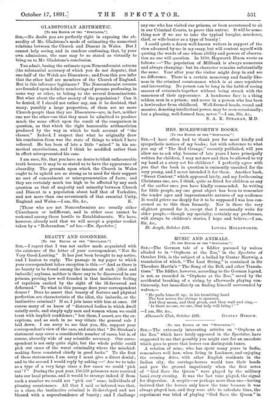BEAUTY AND GOODNESS.
[To THE EDITOR Or THE "SPECTATOR."] Sin,—I regret that I was not earlier made acquainted with the existence of the letter of your correspondent, " Not So Very Good-Looking." It has just been brought to my notice, and I hasten to reply. The passage in my paper to which your correspondent takes exception is this :—" And as there is no beauty to be found among the inmates of such [idiot and imbecile] asylums, neither is there any to be discovered in our prisons, proving how well founded is that instinctive feeling of repulsion excited by the sight of the ill-favoured and deformed." To what in this passage does your correspondent demur ? Does he assert that beauty of feature and physical perfection are characteristic of the idiot, the imbecile, or the instinctive criminal ? If so, I join issue with him at once. Of course many of us know of "distorted bodies in which dwell saintly souls, and simply ugly men and women whom we could -trust with implicit confidence ;" but these, I assert, are the ex- ceptions, and as such in no way vitiate the general rule I laid down. I am sorry to see that you, Sir, support your correspondent's view of the case, and state that " Dr. Strahan's statement may cover a considerable number of cases, but is, of course, absurdly wide of any scientific accuracy. Our corre- spondent is not only quite right, but the whole public could pick out cases of the worst criminality where the mischief- making force consisted chiefly in good looks." To the first of these statements, I am sorry I must give a direct denial ; and to the second I would reply by asking :—" Are we to take as a type of a very large class a few cases we could pick out' ? " During the past year, 150,559 prisoners were received into our local prisons, and it would be strange indeed if from such a number we could not "pick out" some individuals of pleasing countenance. All that I said or inferred was that, as a class, the instinctive criminal is ill-developed and not blessed with a superabundance of beauty; and I challenge
any one who has visited our prisons, or been accustomed to sit in our Criminal Courts, to prove this untrue. It will be some- thing new if we are to take the typical burglar, murderer, thief, or wife-beater as a type of beauty
I could quote a dozen well-known writers in support of the view advanced by me in my essay, but will content myself with quoting the words of one whose ability and powers of observa- tion no one will question. In 1850, Hepworth Dixon wrote as follows :—" The population of Millbank is always numerous and always changing : but its character remains substantially the same. Year after year the visitor might drop in and see no difference. There is a certain monotony and family like- ness in the criminal countenance which is at once repulsive and interesting. No person can be long in the habit of seeing masses of criminals together without being struck with the sameness of their appearance. A handsome face is a thing seldom seen in a prison ; and never in a person who has been a lawbreaker from childhood. Well-formed heads, round and massive, denoting intellectual power, may be seen occasionally; but a pleasing, well-formed face, never."—I am, Sir, &a., S. A. K. STRAHAN, M.D.


































 Previous page
Previous page